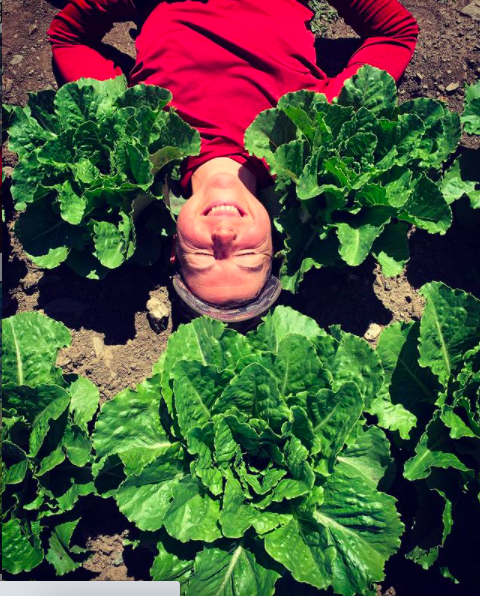What’s Below:
About Lettuce
Cooking & Storage
Recipes
Learn More
ABOUT Lettuce
Lettuce are tender leaves in the Aster family that have their origins in Egypt where they were first cultivated over 4,000 years ago. There and across the Mediterranean and Western Asia it’s been used for hundreds of centuries in culinary and medicinal preparations. These days lettuce is primarily used in salads and sandwiches, and come in a wide variety of types that range in color from reds to greens, and textures from ruffled to tightly curled. The three main types of lettuce are round (head), loose leaf (bunching), and tall (cos/Romaine).
Butter Head Lettuce (Photo Source: Mae Mu)
Loose leaf/Bunching Lettuce (Photo Source: Lulucmy)
Tall Romaine Lettuce (Photo Source: Terry Jaskiw)
At Rock Steady we grow almost ten varieties of lettuce reminding us that lettuce does not have to be a boring salad green.
COOKING & STORAGE
Edible parts: Leaves and stems.
Medicine and Nutrients: The water and trace vitamins and minerals that lettuces provide are great for skin and hair health. The leaves also support digestion, and can provide brightness to a meal of food that includes heavier or more carb-rich dishes.
Storage: For storage, proper air circulation and a small amount of moisture will keep your lettuce crisp and fresh. The easiest way to do this is to line a sturdy glass or plastic container with a few paper towels, then put your lettuce on top. Top with a matching lid and refrigerate.
Ways to Prepare
RAW: Lettuce is best eaten fresh, and is thee go-to for a salad base. Since lettuce is 95% water, it’s also one way to get some serious hydration into your daily meals. Shred or chop up the leaves and top with your favorite vinaigrette or dressing (recipes below). Make it into a full meal by adding roasted root vegetables, dried fruit and nuts, shredded proteins (e.g. chicken, tuna), legumes, and cooked grains. Since lettuce is 95% water, it’s best eaten fresh.
COOKED: Certain types of lettuce (romaine, iceberg, etc.) can be lightly sauteed, steamed, or grilled and tossed with savory sauces or dressings. If you’re new to cooking lettuce, below are some resources for getting into it.
RECIPES & Ideas
Ssambap (Korean rice lettuce wraps) (My Korean Kitchen)
Cooked Lettuce with Oyster Sauce and Garlic (Woks of Life)
Dressing and Vinaigrette Ideas:
Sesame Ginger Dressing (Nom Nom Paleo)
Blackened Ranch Dressing (A Girl Called Adri)
Simple Salad: Mix up your favorite salad and top off with your favorite salad dressing! Here are some basic vinaigrette ingredients, remember to play around with flavors and ratios to keep your salad game exciting!
Olive oil for your base
Vinegar of choice (try apple cider, rice wine, champagne, red wine, etc)
Dijon mustard for some flavor complexity and creaminess
Maple syrup or honey for a little sweetness that balances the vinegar (you can also add a fruit jelly or jam as a substitute!)
Garlic (for a kick)
Salt and pepper
Fresh herbs if desired
Learn More
Cooking with Lettuce (Woks of Life)
Lettuce History Deep Dive (Seeds & Receipts)
Authored and compiled by Maya Marie of Deep Routes, Ayllen Kocher, and Amara Ullauri






